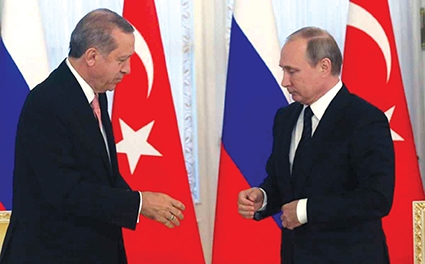A Deeper Look at Turkey-Russia Relations
Op-Ed
Despite the fact that, historically, Moscow and Ankara have been geopolitical rivals, there are now a number of common interests driving both countries to work more closely. The first arena of cooperation is the Syrian battlefield. Although the two powers have different views on the future of the Syrian president Bashar al-Assad, Moscow and Ankara cooperate not to allow the Kurdish issue to get out of hand. Russia has been closely working with Iran since the beginning of the Syrian civil war in 2011 and, quite naturally, this must have alienated the Turkish side. However, there are hints from time to time that Russia and Iran have disagreements over the future of Syria. For instance, the Iranian formula of support for the Syrian government does not include any compromises regarding the Assad family, whereas Russia has been always willing to make some concessions on the diplomatic front as long as its core interests in Syria, military bases and political influence, are retained. And here, too, Ankara and Moscow could at times share similar views on constraining Iranian ambitions.
Both share somewhat ambiguous relations with the US. Although Turkey is a NATO member and quite naturally should have been closely aligned with the western powers in Syria, Ankara nevertheless has its own clear goals based on its geographical needs and interests in the broader Middle East. Ankara was wary of the US military aid to the Kurds in Syria and other issues on the future of Assad’s regime. Russia is also concerned with the US actions in Syria and within the wider former Soviet space.
Beyond the Middle East conundrum, Turkey and Russia also share difficult relations with the EU. Ankara has been strongly criticized by Brussels of late, while Russia has been in a standoff with Europe over Ukraine since 2014. Moreover, the two countries have extensive economic and military projects, such as the selling of Russian S-400 to Turkey; Russian participation in the construction of the Akkuyu nuclear plant in Turkey and the progress on the massive Turkish Stream gas project which will enable Russia to bolster its gas exports to south Europe by circumventing Ukraine.
They Also Share Differences
Despite some concrete steps in furthering bilateral relations, Turkey and Russia still remain geopolitical rivals with overlapping interests in several strategically vital regions. One such theater is the Black Sea region. Turkey’s geographic position gives it the longest shore on the Black Sea and natural control over the Bosporus and Dardanelles straits, making the country capable of projecting its military and economic power across the entire Black Sea. The area has historically been a battle ground between the Russian and Ottoman empire since the 18th century, followed by the Cold War military dispositions. Thus, Turkey, like Russia, has a natural interest in extending its zone of influence in the Black Sea, leaving little room for the two countries to find a foundational compromise in the longer run. To this should be added Russian military moves in the region since 2014, when Moscow incorporated the Crimean Peninsula which, due to its geographic position, gives the Russians the upper hand in terms of military infrastructure and the ability to cover all the shores of the Black Sea.
To the east of the Black Sea in the South Caucasus, Turkey and Russia share somewhat different views on the region. Ever since the collapse of the Soviet Union, Turkey has actively worked on reconnecting the South Caucasus region to its growing energy consumption market by initiating/facilitating various east-west energy and infrastructure projects. The Baku-Tbilisi-Ceyhan and Baku-Tbilisi-Supsa pipelines, as well as the new Baku-Tbilisi-Kars railway, are only some of those major projects Ankara is currently supporting. (At the same time, as I wrote several weeks ago for GT, Turkish-Georgian relations will not be sacrificed because of progress in Russo-Turkish relations).
It is in Turkey’s vital interests to keep Russia away from the Georgian transit corridor. Indeed, there are reasons for Turkey to worry, as Russia recently moved makeshift border signs of the South Ossetia demarcation line further south, threatening the vital East-West highway connecting the Caspian and the Black Seas. Although it is very unlikely at the moment that Turkey will militarily confront Russia in the region, Ankara nevertheless is thinking about increasing Georgia and Azerbaijan’s military capabilities. The Trilateral Format of cooperation between the three countries has boomed since its inception in 2012.
Another area of different worldviews between Russia and Turkey is the simmering Nagorno-Karabakh conflict. Russia has its own agenda for conflict resolution. In fact, Moscow would prefer to keep the existing status quo as long as possible, but constant fighting with occasional radical spikes in clashes leaves little room for keeping the existing formula. That is why Russia would always want Turkey (as Azerbaijan’s ally) be as much distanced from the conflict as possible.
Further east in Central Asia, Ankara deems itself a natural ally of all Central Asian states as there are strong ethnic ties between Turkey and Turkic peoples of Kazakhstan, Kyrgyzstan, Turkmenistan and Uzbekistan (Tajiks have always been more influenced by Iranian culture). As Russian economic influence in the region decreases, so is Russian cultural influence. For instance, Kazakhstan announced this year that the country will be transitioning from a Cyrillic to a Latin version of alphabet. The move is widely seen as the slow process of Central Asian states slowly rejoining the Turkic cultural world which they have historically belonged to.
Thus, overall, when we talk about Russia-Turkey relations, we should always discuss them in the wider context of the Black Sea and the Middle East.
Emil Avdaliani teaches history and international relations at Tbilisi State University and Ilia State University. He has worked for various international consulting companies and currently publishes articles focused on military and political developments across the former Soviet space and the Middle East.
Emil Avdaliani












